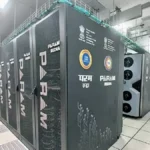Salt Typhoon: Chinese Espionage Group Targets Trump and Vance in 2024 U.S. Election
Overview of the Incident
In a significant development concerning cybersecurity and national security, the Chinese espionage group known as “Salt Typhoon” has reportedly intensified its operations targeting prominent figures in the upcoming 2024 U.S. election. This group is believed to have hacked into systems associated with the campaigns of former President Donald Trump and Ohio Senator J.D. Vance. The implications of these cyberattacks could have far-reaching effects on the electoral process and the integrity of democratic institutions in the United States.
Tactics Employed by Salt Typhoon
The Salt Typhoon group has been utilizing sophisticated techniques to infiltrate campaign infrastructures. According to cybersecurity experts, these tactics include spear-phishing emails, malware deployment, and exploiting vulnerabilities in software used by political campaigns. The group’s sophisticated approach indicates a high level of expertise and planning, aimed at gathering intelligence and potentially manipulating the political landscape in favor of their objectives.
Reactions from Political Figures
The news of these cyberattacks has triggered widespread concern among political leaders and national security experts. Trump and Vance have both condemned the attacks, emphasizing the need for stronger cybersecurity measures to protect American electoral integrity. The U.S. government has been urged to take immediate action to counter such threats and ensure that foreign interference does not compromise the upcoming elections.
Implications for U.S. National Security
These developments highlight the ongoing threat posed by foreign entities to U.S. national security, especially during pivotal moments such as elections. The targeting of high-profile political figures by state-sponsored hackers underscores the need for enhanced protective measures and strategies to safeguard democratic processes from external influence.

Why This News is Important
Impact on Democratic Processes
The targeting of political candidates by foreign espionage groups raises critical questions about the integrity of democratic processes in the U.S. Elections are fundamental to democracy, and any foreign interference can undermine public trust in the electoral system.
National Security Concerns
This incident emphasizes the vulnerabilities within the U.S. electoral system and the need for robust cybersecurity protocols. Ensuring the security of electoral infrastructure is paramount for national security and the safeguarding of citizens’ rights.
Call for Legislative Action
The revelation of these cyberattacks may prompt legislative bodies to take swift action, enacting laws that bolster cybersecurity measures across political campaigns. Such actions could lead to increased funding and resources for cybersecurity defenses.
Cybersecurity Awareness
The incident underscores the importance of cybersecurity awareness among political candidates and their teams. Enhanced training and resources can help mitigate the risks posed by espionage activities.
International Relations and Diplomacy
This event could strain U.S.-China relations further, as allegations of espionage and interference can lead to diplomatic tensions. It highlights the need for international dialogue and cooperation to address cybersecurity threats globally.
Historical Context
Cyber espionage has become a pressing concern in global politics, particularly in the context of U.S.-China relations. Previous incidents, such as the hacks targeting the Democratic National Committee in 2016, showcased the vulnerabilities of political entities to foreign interference. As technology evolves, so do the methods employed by espionage groups, making it increasingly challenging for nations to protect their electoral processes. The Salt Typhoon group’s activities align with a broader pattern of cyber warfare, where state-sponsored actors exploit digital channels to achieve strategic objectives.
Key Takeaways from “Salt Typhoon: Chinese Espionage Group Targets Trump and Vance in 2024 U.S. Election”
| Serial Number | Key Takeaway |
|---|---|
| 1 | The Salt Typhoon group targets high-profile candidates in the 2024 U.S. election. |
| 2 | Sophisticated cyber tactics, including malware and spear-phishing, were used in the attacks. |
| 3 | There is a growing concern about foreign interference in U.S. elections. |
| 4 | Calls for stronger cybersecurity measures are being made to protect electoral integrity. |
| 5 | The incident may impact U.S.-China diplomatic relations, highlighting international cybersecurity issues |
Important FAQs for Students from this News
1. What is Salt Typhoon?
Salt Typhoon is a Chinese espionage group known for its sophisticated cyberattacks targeting political figures and institutions, particularly during significant events such as elections.
2. How did Salt Typhoon infiltrate the campaigns?
The group utilized tactics like spear-phishing emails, malware deployment, and exploiting vulnerabilities in software used by political campaigns to gain unauthorized access.
3. Why is foreign interference in elections a concern?
Foreign interference undermines the integrity of democratic processes, erodes public trust in elections, and poses a threat to national security.
4. What can be done to enhance cybersecurity in political campaigns?
Political campaigns can enhance cybersecurity by implementing robust security protocols, conducting regular training for staff on identifying threats, and investing in advanced security technologies.
5. How might this incident affect U.S.-China relations?
Allegations of espionage and interference could exacerbate diplomatic tensions between the U.S. and China, leading to potential repercussions in trade, diplomacy, and international cooperation.
Some Important Current Affairs Links

















